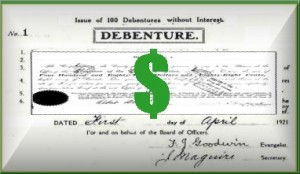In this blog post, Pritishree Dash, a student of National University of Advanced Legal Studies, Kochi, who is currently pursuing a Diploma in Entrepreneurship Administration and Business Laws from NUJS, Kolkata, discusses if debentures can be converted into shares and vice versa.
What are shares?
Every company limited by shares must have a share capital which is the amount invested in the company to carry out its functions. The share capital can be divided into small shares of a different kind. A share is the interest of a member in a company measured for liability and dividend. Section 2(84) of the Companies Act, 2013 defines “share” which means a share in the share capital of a company and includes stock.
What are debentures?
A debenture is like a certificate of the loan or a loan bond evidencing the fact that the company is liable to pay a specified amount with interest and although the money raised by the debentures becomes a part of the company’s capital structure, it doesn’t become share capital. A debenture is a method of borrowing. Section 2 (30) of the Companies Act, 2013 defines inclusively debenture as debenture stock, bonds or any other instrument of a company evidencing a debt, whether constituting a charge on the assets of the company or not. The term debenture covers both secured and unsecured debentures. Section 71 of the Act enables that a company may issue debentures with an option to convert such debentures into shares, either wholly or partly at the time of redemption. The issue of debentures with an option to convert such debentures into shares, wholly or partly, has to be approved by a special resolution passed at a general meeting. On the basis of convertibility, Debentures may be classified into following categories:
(A) Non-Convertible Debentures (NCD): These instruments retain the debt character and cannot be converted into equity shares.
(B) Partly Convertible Debentures (PCD): A part of these instruments are converted into equity shares in the future at the notice of the issuer. The issuer decides the ratio for conversion. This is normally decided at the time of subscription.
(C) Fully convertible Debentures (FCD): These are fully convertible into Equity shares at the issuer’s notice. The issuer decides the ratio of conversion. Upon conversion, the investors enjoy the same status as ordinary shareholders of the company.
(D) Optionally Convertible Debentures (OCD): The investor has the option to either convert these debentures into shares at the price decided by the issuer/agreed upon at the time of issue.

Conversion of shares into debentures
A company may issue debentures with an option to convert debentures into shares, either wholly or partly at the time of redemption, provided that the issue of debentures with an option to convert such debentures into shares shall be approved by a special resolution passed by the shareholders at a duly convened general meeting of the company. Under SEBI (ICDR) Regulations 2009, “specified securities” means equity shares and convertible securities. The “convertible security” has been defined to mean a security which is convertible into or exchangeable with equity shares of the issuer at a later date, with or without the option of the holder of the security and includes convertible debt instrument and convertible preference shares. Additionally, the issuer of convertible debt instruments has to be in compliance with the following:
(a) obtain a credit rating from one or more credit rating agencies;
(b) appoint one or more debenture trustees in accordance with the provisions of Section 117B of Companies Act, 1956 [new section 71(5) of the Companies Act, 2013] and Securities and Exchange Board of India (Debenture Trustees) Regulations, 1993;
(c) create debenture redemption reserve in accordance with the provisions of Section 117C of Companies Act, 1956 [new section 71(4) of the Companies Act, 2013;]
(d) if the issuer proposes to create a charge or security on its assets in respect of secured convertible debt instruments, it shall ensure that:
- such assets are sufficient to discharge the principal amount at all times;
- such assets are free from any encumbrance;
- where security is already created on such assets in favour of financial institutions or banks or the issue of convertible debt instruments is proposed to be secured by creation of security on a leasehold land, the consent of such financial institution, bank or lessor for a second or pari passu (it implies with equal step, equally treated, at the same rate, or at par with) charge has been obtained and submitted to the debenture trustee before the opening of the issue;
- the security/asset cover shall be arrived at after reduction of the liabilities having a prior charge, in case the convertible debt instruments are secured by a second or subsequent charge.
The issuer shall redeem the convertible debt instruments in terms of the offer document. SEBI (Issue and Listing of Debt Securities) Regulations, 2008 deal with compliances with respect to non-convertible debt instruments and apply to (a) Public issue of debt securities and (b) listing of debt securities issued through public issue or on private placement basis on a recognized stock exchange. It deals with aspects which include the filing of offer documents, disclosures, price discovery mechanism through book building and other routine public issue aspects.
Debentures conversion into shares
Section 81(3) of the Companies Act, 2013 permits companies to issue convertible debentures. Convertible debentures are converted into equity shares on maturity. The conversion date and rate of conversion is stated in the prospectus. The company does not redeem convertible debentures. Convertible debentures can be classified into fully convertible and partly convertible debentures.
A resolution for conversion has to be approved at the board meeting. The shareholders, as well as the debenture holders’ approval, is taken for conversion. A special resolution is passed to that effect. A copy of the special resolution is filed with the Registrar of companies within the 30 days of its passing. A letter of the option is sent to the debentures holders, and one copy of the same is filed with SEBI. The secretary then verifies the consent sent by the debenture holders for conversion. A debenture is converted into equity shares. A notice of the conversion is sent, and the debenture holders are asked to return debenture certificates. Secretary carries out the process of allotment of the shares. After allotment, changes have to be made in the Register of charges. Shares certificate is issued to the holders, and their names are entered in the register. A return of the allotment has to be filed with the Register of Companies.
LawSikho has created a telegram group for exchanging legal knowledge, referrals and various opportunities. You can click on this link and join:
https://t.me/joinchat/J_
 Serato DJ Crack 2025Serato DJ PRO Crack
Serato DJ Crack 2025Serato DJ PRO Crack












 Allow notifications
Allow notifications



it is 71(3) of Companies Act,2013 not 81(3)
where is the procedure for conversion of debentures listed?
it is neither in the companies act nor in the Companies (Shares and Debentures) Rules, 2014 and also the 2016 amendment to the rules does not highlight the same. please advise!